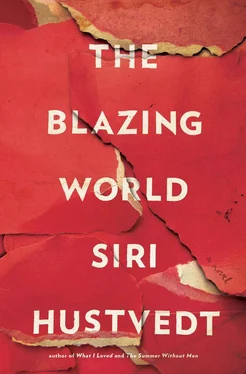I am erased.
Dr. F. says, I don’t think you understood how angry you were.
No, I did not understand how angry I was.
Last night. This I remember, don’t I? Yes, it is clear still, parts are clear enough, although there are peripheries never seen. Too many voices to distinguish any single voice except now and again — a soprano squeal or squawk. The throng in the well-lit white room, the paintings — so little on them — but a few hazy body parts, underpants, garters, bottles of nail polish and perfume. Mildly interesting. The artist smiling. He has a stiff smile, but who can blame him? Long, convoluted essay in the catalogue, quoting that buffoon Virilio.IV Phinny has put his arm around my waist. I can feel his hand. I do remember this warm gesture, this little goodness. In that instant, I worry over Bruno’s refusal to come with us. Maybe it is Phinny’s hand that makes me think of Bruno, my mauling lover. I am back to life under his hands, his rumbling voice, his jokes, but he said, I hate that art world shit. It’s worse than the poetry world, and that’s pretty bad, but there’s no money in poems. Just egos.
Phinny and I: PH. We make an F sound together, as in phuck you .
Last night again. James Rukeyser has heard that I am building on Felix’s collection. He is interested in me now. Oh, yes, I hold a sudden luminous charm. Felix’s wife has Felix’s art and Felix’s money. Maybe he will lure me into a purchase. Show me the cabbage. That is what he means as he smiles. I am wearing my blue velvet beret. My affectation, which is not a pipe, courtesy of Phinny. James gives me his card. I have a flash memory — the stiff paper in my right hand, my thumb visible over the name. The business card is beige with black type. Miriam Bush joins us. “I have not seen you in years, Harriet! Why, what are you up to? Someone mentioned you. Who was it now? Are you still making those little houses?” James looks confused: little houses? He does not know that I have ever made art. When Phinny and I get outside I throw the card away. I see it in the wet gutter, its lettering invisible, just a small rectangle vaguely illuminated by the streetlamp as the ice-cold rain falls.
I am ten in the memory. Am I ten? Maybe I am eleven. I cannot feel ten or eleven anymore, really, can I? No. But I am inside this memory; I am inside my body. I have walked from Riverside Drive to Philosophy Hall on a Saturday to surprise Father. Why have I done it? What possesses me? An idle whim? A plan? No, I am just walking in the spring air, and I decide to walk there. The day is sunny after a rain. Sun over puddles. That seems right, and it comes into my head that I am so close to Father’s office, and I walk through the doors and climb into the elevator. But I am nervous, yes, some anxiety is attached to this bold move. I have been to his office before, as he dashes in to pick up papers, while I wait with Mother. There is a smell in the gray hall, a dry smell like erasers; it is never noisy, hushed but with a hum, white noises, I guess, and low voices here and there, as if these are the sounds of mental work, of thoughts. I knock. He must say Come in, but this I don’t really remember. I see him before me at his desk and the window behind him. The light is hazy; the glass is smudged. His head is down. He looks up. “Harriet, what are you doing here? You should not be here.”
It has nothing to do with you.
“Harriet, you should not be here.” The ten-or-eleven-year-old is flummoxed. I’m sorry. Do I say I’m sorry? I think so. But this is crucial. What is the tone of his voice? Angry? I doubt it. Strict? Puzzled? Perhaps puzzled, but I can’t recall this accurately. What I recall is the drawing in of my breath, the pang, the shame. Why shame? This I know. I am deeply ashamed. In the memory he says nothing more. He looks down at the papers in front of him, and I leave. But is this possible? Maybe he escorted me to the door, and in the shifting eddies of recollection, those steps with Father to the door have disappeared. Maybe he patted my shoulder. He did pat my shoulder sometimes.
And sometimes, too, I heard a hint of musical softness in his voice. I learned to listen for it — a crack in the tone that lifted a vowel into another register, not fully controlled. And something broke for an instant, as if he had seen me, his child, seen and loved.
Mother is lying in bed. I hold her hand and idly look at the protruding veins in it — the palest of greens. I wouldn’t have recalled that if I hadn’t said to myself, Her veins through her skin are the palest of greens . Words consolidate memories. Emotion consolidates memories. Something has happened to Mother after Father’s death, and she is telling now, telling her life, telling me that my father did not want the baby. When she told him she was pregnant he did not speak to her for two weeks. I feel the cramp of emotion, but I don’t want her to stop. After I was born, I want to know, was it okay then? It took some time, my mother says, before he got used to you. Your father loved you, of course.
Hume couldn’t find anything to hold on to, no self in the bundle of perceptions that become memories. Imperfect identity.
He did not want me.

But this is nonsense, Harriet, isn’t it nonsense? How many men have not wanted their unborn infants? Millions. How many women, for that matter? And how many have come to want them once the little thing has arrived, is out, is real? Millions. And yet, it took some time, she said, and there is the feeling, as if I’d been kicked, as if it had all become clear, as if a door had opened to a truth. And I look into the room, and there is the thing that has been born. There is something wrong with it. Count the toes.
But I would first ask you to note that I do not attribute to Nature beauty, ugliness, order or confusion. It is only with respect to our imagination that things can be said to be beautiful or ugly, well-ordered or confused. V
But imaginations mingle, Professor. Imaginations merge. When I look at you, I see myself in your face, and what I see is deformed or missing.
But nothing happened, did it?
There is no one story, no perfect answer to the problem of H.B. Until about the age of three or four, every one of us is hidden behind amnesia clouds. The feelings come back, but we don’t know what they mean.

Perhaps I wished for something rather than nothing — a smack of passion to make me believe I was really there for him, not missing. And then the blow rises up from imaginary depths. When there is nothing, the phantoms come up to fill the emptiness. It is not true that nothing comes of nothing. There is always something. I stand on the stool and look out at the street. Stand beside me, Bodley. Here, there is room for you, too. I love you, Bodley. You are my best friend. Breathe now, Bodley, breathe fire.
Your order is my wilderness, Father. I cannot walk between the high rows of hedges and find my way out. I am not out of the maze. Stifled. I am trying to breathe, but I cannot. I am hardly breathing.
Your patterns did not make sense to me, Father, or, rather, the sense they made is shallow. Tidy formulations to clean up the mess. I have read your papers, and I am a little sorry now, sorry for a life spent on true and false, however lean and elegant the logic.
The “specialist” emerges somewhere — his zeal, his seriousness, his fury, his overestimation of the nook in which he sits and spins — his hunched back, every specialist has a hunched back. Every scholarly book also mirrors a soul that has become crooked… VI
Читать дальше














